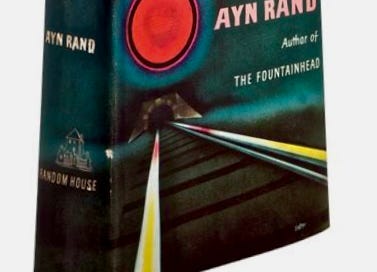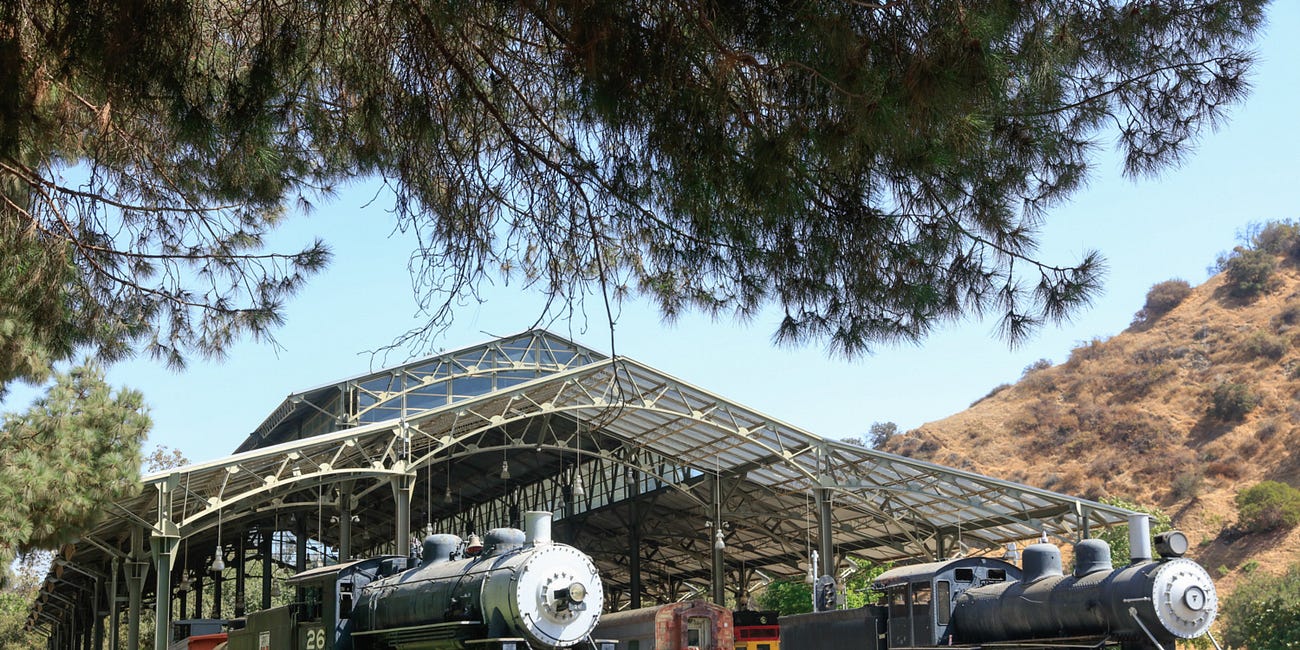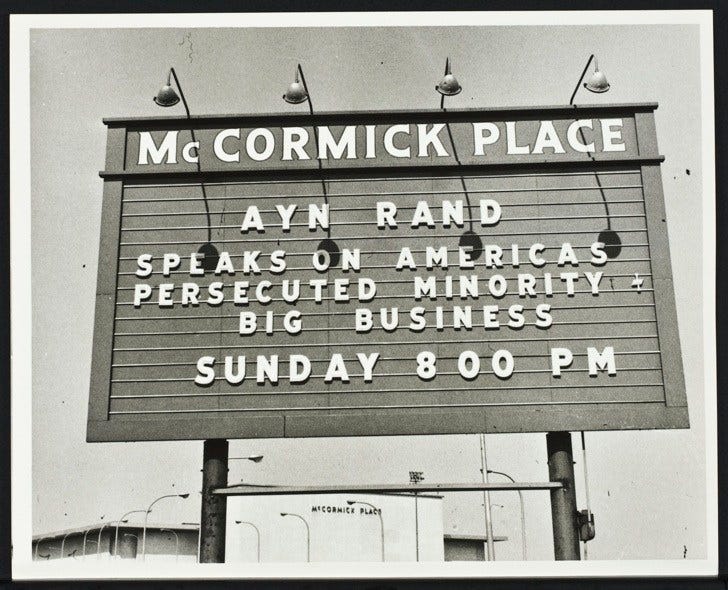New Year’s Southern California Wildfire
2025 begins with a catastrophic realization of the tunnel scene in “Atlas Shrugged”
The new year’s historic wildfires realize the tunnel scene from Atlas Shrugged by Ayn Rand. Several fires started in Los Angeles—by arsonists or other factors—and throughout the region evoke the novel’s apocalyptic dramatization, a tunnel collapse which essentializes ideas in action. Mine is a philosophical, not merely literary, point about the reality of hellfire engulfing my city, society and culture. This catastrophe is an epic disaster. I cannot begin to put the devastation and despair into words.
I won’t try. Instead, permit me to preview what I can do:
Provide a firsthand account of the ongoing disaster of the last several days
Contextualize wildfire in artistic, political and philosophical terms
Avoid or skim speculation
Add thoughts on solutions, causes and effects
Appeal to my fellow Southern Californians and Americans
Those who don’t live, visit or know what it’s like here may not be able to comprehend, let alone credit, the vastness of Southern California’s geography and the corollaries of a sprawling city on this scale. Metropolitan Los Angeles, the nation’s second largest city, sprawls. With pockets and subcultures within a larger culture of a laissez-faire or live and let live, free-spirited ethos, LA is a way of living free. It’s what outsiders detest, envy and hold in contempt. It’s what those of us who live here cherish, love and adore.
Consider beach culture in Malibu, which is different from beach culture in Huntington Beach, Santa Monica or Newport Beach. Or the fragrant placidity of wealthy postcard communities, such as Pacific Palisades. There’s the rich history and craftsmanship in a city of roses, Pasadena. San Fernando Valley cities and neighborhoods are unique, including the city where I work and live, Burbank, home to the Walt Disney Studios, Warner Bros. and Bob Hope Airport. I can house and ride a horse on my property and neighborhood as well as meet and interview Hollywood’s top directors in their studio offices and either board a jet from the tarmac or a train that rides on rails along the West Coast. I can walk to a fitness center, hospital and Disney, all of which I do. San Gabriel Valley cities each have a subculture as well.
The entire region is under an exodus—my friends and colleagues flee the government-controlled economy in volume—and under siege; moment-by-moment danger of extreme fire conditions in perhaps the worst wildfires in the region’s history.
At yesterday’s Weight Watchers coaching session, one of the members who comes every week disclosed that she lost her home. She learned that her dog died the day after she lost everything. The same goes for artists, colleagues and neighbors throughout the region. Knitted across these neighborhoods, towns and communities, such as Brentwood, Hollywood and West Hills, is the passion, resilience and cheerful optimism unique to Southern California. People here maintain this every day while waiting at gasoline stations, parking spaces and Starbucks as well as at Costco, In-N-Out, Walmart, Disneyland and Trader Joe’s. Drivers pause with magnanimity to defer—even at their most assertive—though you need to act quickly (if you blink, the opportunity is lost because people here tend to be purposeful with places to be and things to do), but reciprocity’s prevalent in everyday action, exchange and interchange. Southern Californians of all types know they live in paradise.
Generally, Southern Californians are not envious. Like most Americans, they do the best they can. As microcosm of the rest of America, Southern California represents America with upward vitality; markedly more so in my experience than in Northern California, where people generally withdraw, center upon themselves and view strangers with scorn and suspicion. I know I’ll learn more from Southern Californians who lost everything in time (and for now, I have a home that’s not in harm’s way).
Danger continues today as wind conditions worsen. Government and police press conferences disclose that criminals dress as firemen and loot homes and private property in places where property and people burned. Mass death count is 24 as of this writing. The death toll’s rising.
False alerts terrify residents, who wander in a stupor out of homes to look up at skies and hills and wonder where the danger’s coming from only to realize the government has failed again to forewarn them and it’s a false alarm. Other endangered areas get no warning at all, despite billions of dollars spent on government programs, subsidies and redistribution of wealth. Warnings about fire and wind conditions were issued well in advance—similar to forewarnings in advance of the Islamic terrorist attack on that black Tuesday in September 2001—before the mayor decided she needed to visit an African state. According to credible reports, the fires may be caused by criminal gangs scouting streets, canyons and back roads, including fire roads.
Some reports include eyewitness accounts of bands of terrorists exiting multiple vehicles en masse, dispersing into the brush and emerging as flames erupt before returning to loot houses burned to glowing embers. Credible witness accounts appear to show and report mentally ill bums or “homeless” persons starting fires—tapping the failure of the governor’s war on “homelessness” announced many years ago. Exorbitant expenditures on government programs and regulation of housing, insurance, air, water, land, “the environment” (including arbitrary and capricious permitting and reports), health, welfare, elections, assembly and life destroy and impair the ability to create and make money.
I drove home in a city blackout after being evacuated from downtown when the lights went out—while dodging collisions with other motor vehicles in the dark without street or traffic lights—I thought of a city tree subsidy program as I swerved around downed trees and branches on every street. Downed trees taxpayers had been forced to subsidize blocked government-controlled roads in darkness caused by government-controlled blackouts. It felt like I was living in a world gone mad.
This is dystopian California. The nation’s vice-president, whom I‘ve learned owns a house in Brentwood, the governor, the mayor of Los Angeles, who until recently was still in Africa, touting her identity as being based on blood—failed the people of Southern California. They failed during a two-year lockdown on life. Californians elected these asinine politicians. In this sense, most people are to blame, including myself to a certain extent. I don’t deserve as much of the blame (and presumably neither do you) because I oppose the taxes and regulations ruining our lives. Knowing this, I choose to live in this beautiful part of the country in spite of evidence that politicians are ruining lives with greater efficiency and will surely get around to more systematically ruining mine.
I know that what’s happening in Southern California will happen near you, too. It doesn’t matter whether where you live is rural, urban or suburban. The Atlas Shrugged tunnel scene, in which people who sanctioned the factors that let the tunnel collapse get the outcome they deserve, is coming until and unless Americans make better electoral choices. Know the relevance of Ayn Rand’s literature, philosophy and, in particular, the theme of Atlas Shrugged. It’s a best practice in self-defense.
Occasionally, a reader criticizes me for referencing Ayn Rand. I admit that this is a legitimate point. I strive to include Rand’s ideas, quotes and literature strictly and only as I deem relevant to a particular topic and, as an Objectivist, I may tend to overdo the inclusion. I think the criticism’s often a projection that the critic, even if he’s in the intellectual arena, prefers to ignore or evade making certain connections, tie-ins or integrations and/or is wrong—and that he knows he’s wrong—and refuses to admit knowing that Rand is right in her apocalyptic forecast.
These critics typically do not read writing by Ayn Rand. They generally don’t study, know or understand Ayn Rand. They live and cower in fear of a voice of reason. Like most Americans, they can tend to suffer under delusion and denial. This avoidance of thinking more than anything causes wildfires and makes them possible, making cataclysm, catastrophe and mass death likely or at least possible—whether in a gas explosion, train derailment, plane crash, or hurricane, twister, terrorist attack, act of war or earthquake, mudslide or flood. I suppose if you are still reading, you know this.
The government will once again fail on a grand scale, probably in your lifetime. Those supporting surveillance and welfare statism exacerbate the problem. Whether a false nuclear attack alarm in Hawaii, a woman burned alive on a New York City subway or the new year’s wildfires in Los Angeles, abnegation of government’s proper role and practice is often deadly—and the stakes are getting higher as the scale widens and widens. Rand pinpoints each problem, identifies its cause and forecasts a solution. This is why I cite her work.
Among those who’ve complained about my references to Ayn Rand are an editor I worked with for several years. He’s a good editor, though I don’t work with him anymore. I’d come to know him personally, as well as professionally. In occasional, offhanded digs, he’d critique the ubiquity of my references to Ayn Rand.
I admit I’m not surprised that, despite his purporting to care, I have not heard from him—this editor, an avowed leftist who touts religion and altruism—though I’ve heard from those I haven’t corresponded with in years in the midst of the worst wildfires in recent American history. This person’s one of the most articulate and persistent voices for “diversity, equity and inclusion” (DEI; a euphemism for conformity, enmity and exclusion), so it’s reasonable to suppose he’d reach out during this disaster, which destroys life and property. That invoking Ayn Rand too often elicits his criticism while a rare catastrophe threatening life and property breeds silence affords an important clue—a sign of the evader’s or ignorant’s ultimate inversion: the sickness is nihilism.
What lesson can one learn? Those who falsely claim to care can be trusted not to show up. They’re blank, vacant, bereft. They’re not coming to your aid or rescue. They ditch, dodge and abandon you every time. This is what goes to the root of the psychology and philosophy of those killed in the tunnel scene. The vacancy—the emptiness—nothing, nothing at all—shows that they act without regard to value, let alone offering a value. Ayn Rand’s masterful literary plot point that the nihilist gets his just deserts in the deepest and ultimate sense carries a lesson for everyone in wildfire.
The one who values comes through. He’s active, he thinks—he creates—he trades. He’s there if only in the shadows or on the fringe, waiting to extend a hand to steady yourself when you feel like you’re spiraling and the world’s going down in flames amid darkness. The one who values doesn’t make a fuss about valuing. He’s neither cynical nor smug and he’s a source of light, enlightenment and life. He’s here in Southern California tonight. As long as he lives and has a home, he’ll be here tomorrow. He, too, needs a champion in every one of us. He, too, needs light to live. Right now, in the first days of the new year, he’s choking in the smoke and groping in the dark. He’s valiant, strong and he’s innovative. He is neither omniscient nor invincible.
The tunnel collapses on the moving passenger train in Atlas Shrugged. Everyone’s crushed. The people on the train are the disaster’s cause. The same is true in LA and it’s true wherever you live in America, too, whatever the police and firefighting budget, bridge, barge, dam, bollard, fire hydrant, water reservoir, police report, intelligence memorandum or act of nature. It’s not that the West is coming to an end, although there’s ample evidence that it is. It’s that you’re voting for it to be ended by slick, weaselly men who lust for power, leave water tanks empty and put the dirt, fish and insect above life, liberty, property and the pursuit of happiness. Here, the Governor prohibited the individual collecting rainwater on his own property in the name of saving earth, “the climate” and the environment. But we the people voted to recall the governor—and the majority of Californians elected to keep him on the job.
This is what fuels the wildfires that burn this city to nothing but a heap of ash and mass, gray death and destruction, leaving the city in ruin. The world can end. The good can be killed. The worst is yet to come. “The worse the coming future, the more it should motivate its opponents,” Leonard Peikoff argues in The DIM Hypothesis: Why the Lights of the West Are Going Out. Be motivated to be part of the paradigm shift for a change from darkness, wildfire and death to brightness, clarity and life. Take a look at the alternative in LA’s rubble, ruins and dust: this is what the world’s coming to—an unstoppable inferno—and you can acquire knowledge of what you can do to stop it (i.e., read Ayn Rand).
Finally, if you live in Southern California—particularly if you live in Los Angeles County—know this: you are not alone. You may feel isolated, frightened and panicked. I know I do at times. If you’re reading this, wherever in Los Angeles or America you are, and you’re feeling like a wall of fire is bearing down upon you and you’re frozen or stricken for a moment—overwhelmed with racing thoughts of what you can do, what you can grab, fending off the rational fear that it feels like the world is coming to an end and you will perish—know that you can get through the crisis.
Even if you don’t understand, let alone agree with, everything I’m writing and arguing in this essay (and perhaps especially if you’re confused, scared and uncertain), know that you are a Southern Californian—you are an American—and your life belongs to you and, because you’re reading this of your own volition, it’s probable that you know it. Take a deep breath, activate your mind, check your premises, compose yourself and resolve to get through this knowing there’s a whole world of good people waiting to warm, welcome, cheer, create and trade with you. It’s a world of peace and tranquility which awaits you. You belong in this world.
No matter what hardship or challenge you face right now, tomorrow or in the years to come, I know you can persevere. I know this because you’re reading what I wrote. I know this because I know I can, too. I wish I could take your hand. Don’t let it go. Reach, look and go within yourself. Do what you know is best for yourself. That’s all. Let’s roll.
Related Articles and Links
Obituary: Brianna Kupfer
This is an article about the death of one of America’s able ones. Designer Brianna Kupfer was murdered at random hours before she was scheduled to depart to celebrate a friend’s birthday. Unlike George Floyd, Brianna’s name won’t appear on a Black Lives Matter banner. There’s no Me, Too movement for victims like her. There have been and will be no prote…
Travelogue: Travel Town, Los Angeles
Discover a subversive showcase of iron and steel machines on nine acres within America’s largest contiguous public city park. I’m referring to the land in Griffith Park—inside Southern California’s city of angels—known as Travel Town. Coal, steam and diesel-powered locomotives with freight, passenger and other railroad cars occupy much of the property, …
Five Reasons to Celebrate Ayn Rand
Because she challenges today’s ideals, you’re more likely to prosper if you think about Ayn Rand’s philosophy and writing. Altruism, the idea that you only exist to help others—that you are a means to the ends of others—and that helping others is paramount is anathema to Rand’s philosophy, Objectivism. If you get nothing else from reading this article, …








This marks the first time I’ve commented on one of my own articles with regard to reader feedback. Your replies are my reward.
One of my paid subscribers reached out by telephone last night. We’ve been exchanging messages and greetings for years, though I’ve never heard the voice of the one whom I know works extremely hard and practices artistry and written communication with eloquence, warmth and wisdom. What this reader said last night moves me. It was like someone stepping out of the shadows I wrote about in the article, reaching out to take my hand.
Others connected in various ways, including in this forum. Friends, strangers, people with whom I’ve been acquainted for years – even decades – and each expression from every individual fuels me. This media celebrates a fourth anniversary on Friday. You, dear reader, make me want to pop the champagne a bit early. You are the best. I know I deserve it. So do you.
My heart goes out to you. I have many happy memories of vacations in Southern California, and much sorrow these past decades over what it's citizens have done to the paradise they live in. I hadn't even thought of the Atlas Shrugged train disaster, but it is the perfect comparison - so apt for a situation where it is the people's choices based on the philosophy they live by that ultimately bring on their necessary destruction. I'm out here trying to change that evil philosophy our fellow citizens take as a given just as I know you are and a few thousand of us around the world. But there are so few of us and so many of them. There is no turning back on this fight, though. I see too clearly the epic disaster that awaits us all if that evil philosophy isn't overthrown and replaced with one based on reality, reason, rational self interest and rights.